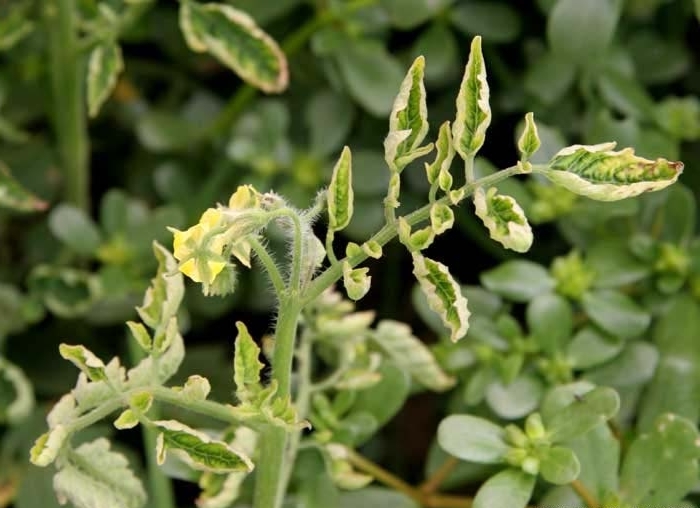 A modification in the DNA of the original culture resulted in a new variety of super-tomato that is resistant to the harmful tomato yellow leaf curl virus (TYLCV), which reduces the surface of the leaves and causes them to curl upwards, and harms this fruit's growth and production.
A modification in the DNA of the original culture resulted in a new variety of super-tomato that is resistant to the harmful tomato yellow leaf curl virus (TYLCV), which reduces the surface of the leaves and causes them to curl upwards, and harms this fruit's growth and production.The initiative, led by researchers from the University of Costa Rica (UCR), involves introducing the virus resistant gene into the plant's DNA.
Researchers are using biotechnological tools to carry out the process. Once the gene is introduced, researchers wait for the plant to produce fruits to plant more crops; then, ten days after being planted, their DNA is extracted and molecular markers are used to discover if the plant is resistant to the virus.
According to Walter Barrantes Santamaria, one of the researchers of the project, molecular markers are variants or mutations in the DNA that allow scientists to differentiate one genotype from another thanks to the presence or absence of that mutation. In this case, the mutation is linked to the resistance to the virus, he said.
Barrantes said that they performed this process using a technique called High Resolution Melting (Curves of Fusion). To create this tomato variety, researchers use modern genomic tools to accelerate the process, as it would take them more than ten years to achieve these results using conventional methodologies, he said.
High Resolution Melt (HRM) analysis is a powerful technique in molecular biology for the detection of mutations, polymorphisms and epigenetic differences in double-stranded DNA samples. It was discovered and developed by Idaho Technology and the University of Utah. It has advantages over other genotyping technologies, namely:
• It is cost effective vs. other genotyping technologies such as sequencing and TaqMan SNP typing. This makes it ideal for large scale genotyping projects.
• It is fast and powerful thus able to accurately genotype many samples rapidly.
• It is simple. With a good quality HRM assay, powerful genotyping can be performed by non-geneticists in any laboratory with access to an HRM capable real-time PCR machine.
"These are works that have been published by other researchers around the world, what we did was to search the literature of those markers and test them to see if they worked. We are using the ones that worked," he added.
The project, which started two years ago, after the TYLCV was detected in Costa Rica, is currently being carried out at the Fabio Baudrit Moreno Agricultural Experimental Station, of the UCR.
Source: samanariouniversidad.com, freshplaza.com


 A modification in the DNA of the original culture resulted in a new variety of super-tomato that is resistant to the harmful tomato yellow leaf curl virus (TYLCV), which reduces the surface of the leaves and causes them to curl upwards, and harms this fruit's growth and production.
A modification in the DNA of the original culture resulted in a new variety of super-tomato that is resistant to the harmful tomato yellow leaf curl virus (TYLCV), which reduces the surface of the leaves and causes them to curl upwards, and harms this fruit's growth and production.


























